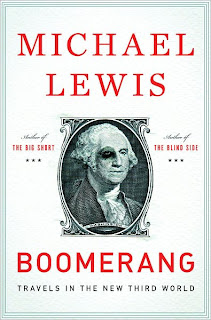Michael Lewis is a reporter -- generally a good one, I should add -- whose tropism is always towards the corridors of wealth and power. (His very first book, Liar's Poker
Boomerang collects five related articles from Vanity Fair, published between mid-2009 and late 2011, about how the bursting bubble of 2007-8 affected Iceland, Greece, Ireland, Germany, and California. In each place, Lewis has amazing access to major players -- in the last chapter, he goes biking with just-barely-former Governor Schwarzenegger, for example -- and is occasionally very mildly critical of their glib rationalizations. Iceland, though, is seen as a nation of unsophisticated fishermen who decided to transform themselves into investment bankers, got their lunch eaten by the actually smart investment bankers (the ones Lewis hobnobs with in New York), and crashed all three of their banks and much of the rest of Europe along the way. The Greeks have a society almost entirely based on cheating, from the least laborer up to the highest levels of government, and their entry into the Euro was a colossal blunder papered over by an expectation that markets would always rise and the fake Greek budget would, somehow, turn real along the way. Ireland turned itself into a real-estate Ponzi scheme, in which everyone sold property back and forth to each other and poured their GNP into just building more property until that was unsustainable. Germans are the stupidest, most gullible investors in the world -- and, incidentally, obsessed with their own feces -- so the entire crisis is their fault, since their money facilitated the bubble. And the USA, as exemplified by California and doubly exemplified by the city of Vallejo, is just another Ponzi scheme, this time of pensions for retired government workers.
Nowhere in this litany of woe and blame is a second of contemplation for where all of the money -- highly leveraged money, of course, another point that Lewis ignores -- to enable all of these bubbles came from. (Some of it came from the Germans, but they didn't initiate anything -- they just bought packaged crap.) Lewis entirely ignores the big investment banks -- primarily US and British -- that made a mockery of risk management, took leverage to new, dizzying heights, and cobbled together horrible loans into CDOs and other exotic investments that they could pretend were risk-free. He also ignores the rating agencies that took their massive fees from those banks and certified that, yes, you betcha!, those exotic investments were just as iron-clad and gold-bottomed as anyone could possibly hope. And he finally ignores the government regulators of a dozen countries whose job it was to keep an eye on such shenanigans, and who utterly failed to do anything about it.
So Boomerang is a quite entertaining, lively little book. But it's also very much like the story of a rape investigation that spends its entire time detailing the minutia of the victim's clothing and behavior on the night of the crime -- it is entirely beside the point.

No comments:
Post a Comment